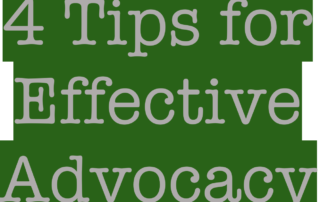**Following my recent webinar focused (ironically) on understanding ADHD, an attendee sent me a message asking for some guidance on how to be an effective advocate. After I responded, I thought maybe I would share it with everyone. This isn’t an exhaustive list, they’re just the first things that came to mind. Do Not Hide The most important place to start is to be out in the open. Talk about your ADHD in a matter-of-fact way. Share your story. You don’t have to work it into your conversation because it is your actual life. The best way to advocate is to educate. What you are educating people about is what ADHD looks like in everyday situations. Once we’ve sown the seeds of awareness, sometimes attraction is more effective than promotion. If all we ever do is advocate and educate then people won’t want to hear from us anymore. There’s an ebb and flow in this process. Everything is a teaching opportunity but not everything is a teaching moment. Find your People Join organizations that promote awareness like CADDRA, CADDAC, CHADD, etc. Follow FB pages or IG accounts that are devoted to building a sense of community within the ADHD world, not just lamenting the current conditions. […]
Join the Club! An Alternative ADHD Screening Tool
The more I work with clients with ADHD and explore the common threads that link us together, the less satisfied I am with the screening tools that are used. It’s not that the tools are inaccurate, it’s that they are incomplete, in my opinion. It is hard to boil the lived experience of ADHD down to 18 questions on a form, I’ll give you that, and you probably don’t want to make the form too long or complicated or the client will get distracted, forget that they are doing it, get bored and put it down and lose it, etc. Having said that, I find that one of the advantages of being a clinician who actually lives with an ADHD brain is that I can sometimes go beyond the surface-level questionnaires and dig a bit deeper into the more subtle aspects of being this way. For this reason, I have come up with my own questionnaire. It is not scored, there is no rating scale and there is no cutoff, categorical designation that tells you whether you “have it” or not. Instead, read through it, or have someone read it to you and think on each item: Can I relate […]
Epigenetics: The Impact of Environment on Development
In new article published online in ADDitude Magazine, Dr. Joel Nigg reviews some recent findings on the impact of environment on the development of ADHD traits. Long thought to be strictly a genetically inherited brain dysfunction, increasing amounts of research (along with increasing amounts of attention paid to previous research) are demonstrating a clear link between ADHD development and the environment. This field of research, focusing on the link between genes and environment, is known as epigenetics. In this case, the prefix epi- refers to something beyond, over, or upon something else. In other words, epigenetics studies the factors beyond simple genetics (if there is such a thing as simple genetics) that influence the development of certain traits. In his article, Dr. Nigg states, “Epigenetics paints a much more complicated view of ADHD, but also a much more optimistic one; genes do not solely determine an individual’s fate.” For those who struggle with ADHD, the round pegs trying to fit into square holes, one of the bleakest aspects of daily life is the belief that things will always be this way and cannot be improved. Epigenetic research is telling us more and more that this belief is false. Nigg reports, […]
MY ADHD Story
In 2008, I attended a workshop given by Dr. Gabor Mate. He is a renowned expert in addiction, addiction treatment, and the impact of childhood stress on the developing brain. Needless to say, I learned more than I could write down and ultimately decided to put my pen down and just listen. What I did write down were the names of the books he has written. I then went and bought all four of them and started reading them all at once (hint #1). They were all full of awesome insight and scientific ammunition. Anyway, one of the books was called “Scattered Minds”, and it was a book about ADHD (Attention Deficit Hyperactivity Disorder). Since so many of my clients have been (or should have been) diagnosed with ADHD as children, I thought I should learn more about it. What I discovered as I madly devoured this book, was that I displayed almost all of the characteristic signs of ADHD and had done so throughout my life. I realize this is a common experience, even the subject of research, called “psych student syndrome” where people tend to over-identify with lists of signs and symptoms and diagnose themselves with every condition […]
10 Favourite Quotes from Dr. Gabor Mate
In no particular order, I present 10 of my favourite pieces of wisdom from Dr. Gabor Mate, bestselling author of “Scattered Minds“, “When the Body Says No”, “In the Realm of Hungry Ghosts”, and co-author of “Hold on to Your Kids”. 1. It is impossible to understand addiction without asking what relief the addict finds, or hopes to find, in the drug or the addictive behaviour. There is a purpose to all behavior and feelings. We just need to look a little deeper to find it. On the surface, addictive or self-destructive behavior seems illogical but if we focus its benefits, few though they may be, we will be able to unlock the mystery of the behavior and put ourselves in a position to change it. 2. The DSM … defines attention deficit disorder by its external features, not by its emotional meaning in the lives of individual human beings. I’ve noticed this in discussing the symptoms with doctors, even those who specialize in treating the condition. The list of symptoms and signs makes very little room for the emotional impact of poor time management, poor attentional control, lack of follow-through, impulsive behavior, and constant restlessness. The list doesn’t touch […]
Hard Things Made Easy? Not Quite
As a counsellor, I have been approached for help with a wide variety of issues. Sometimes it is a last-ditch attempt to save a relationship where years of muddy water has passed under the bridge. Sometimes it is eliminating the effects of a life-changing traumatic experience. Sometimes it is rewiring the brain of a child or partner who has special needs or mental illness. Regardless of the specifics, the basic element of many of these problems is the client asking me the following question: How can I do something hard in an easy way?” Predictably, my answer to this question is not always satisfactory. You can’t always clean up the mud, you can’t always erase trauma, you can’t always rewire someone’s brain, and even if any of these things are possible, it is never easy. There are many ingredients to change, but most important to the recipe is time and effort. Education that leads to understanding can certainly help this process, along with the support of the important people in your life, but even these tools can only go so far in the absence of time spent working on the issue. I’m not just referring to time spent on the […]
Three Kinds of Procrastination and What to Do About Them: Part 3
Truth be told, even though these posts are all being published within a few days of each other, I originally started the series back in July. Don’t worry, three months is hardly even in the ballpark of my all-time record for procrastination. I once went seven years between journal entries. Anyway, I hope you’ve got something so far out of the series. Here’s the final instalment. 3. Defiance and Rebellion (Counterwill) Gordon Neufeld, child psychologist and author of the best-selling book “Hold On to Your Kids”, often refers to a natural, instinctive phenomenon which is known as counterwill. Simply stated, counterwill is the instinct to resist the efforts of others to control us. Neufeld demonstrates this instinct in his lectures by inviting an audience member to hold their hand up. He then pushes gently against their hand. As he does so, it is plain to see that, without any thought, the audience member instinctively pushes back. As I said before, counterwill is an instinctive response. However, it may grow much stronger in unhealthy environments. If you are a child who is overly controlled by a parent or authority figure, you may adapt by acquiescing and completely abandoning your own will […]
Three Kinds of Procrastination and What to Do About Them: Part 2
Ok, it’s been 10 days since I finished writing the first installment of this article. I kind of knew that would happen. I knew it would happen because it’s happened so many times before. Despite this knowledge, I often feel powerless to do anything about it. Today, I’m going to address another reason why I might feel that way as well as making some suggestions that might help to overcome it. Lack of Motivation This may seem overly obvious as an explanation but motivation is much more biological (biochemical, to be specific) in nature than people realize. Wanting to do something isn’t as simple as being interested in doing it and then doing it. In order for any activity to be motivating, even those that we experience as intrinsically rewarding or intensely pleasurable, we rely on the presence of a critical neurochemical known as dopamine. Dopamine has many functions, depending on where in the brain and body it is being used. It is a pleasure chemical (stimulants increase dopamine levels, as does sexual activity). It also provides physical energy. It is implicated in control of fine and gross motor control (Parkinson’s patients don’t have enough dopamine in the part of […]
Three Kinds of Procrastination and What to Do About Them: Part 1
The idea for this article came to me some time ago. I cannot say how long specifically because I’ve avoided writing or thinking about it as much as possible, so the timeline has become a bit fuzzy. This isn’t because I think this subject is boring, or useless, or unoriginal, or any of those reasons. I have been procrastinating, something that I am especially adept at. If they ever make procrastination an Olympic sport, I will win the gold medal for sure, as long as I got around to registering for the competition. I know that I procrastinate. Everyone who knows me reasonably well also knows this about me. Many of my clients know this about me. It’s one of the reasons that I don’t let it bother me when other people procrastinate. Given my familiarity with procrastination, the question that must be asked is not regarding how I procrastinate, it is regarding the reasons why I do so. The word procrastinate, according to its Latin roots, means quite literally to “put off until tomorrow”. Wow, that means that even by procrastination standards, I’m an over-achiever. I’ve been putting some things off for years! I procrastinated throughout school, from early […]













Recent Comments